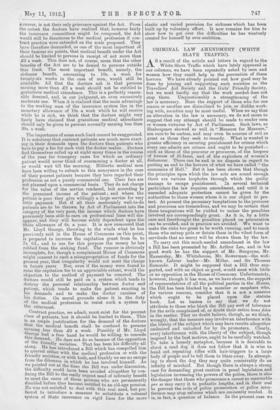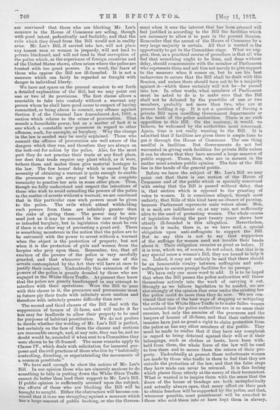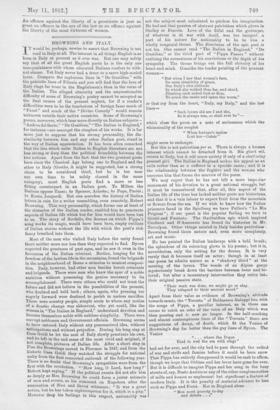CRIMINAL LAW AMENDMENT (WHITE SLAVE TRAFFIC).
AS a result of the article and letters in regard to the White Slave Traffic which have lately appeared in our columns, we have been repeatedly asked by men and women how they could help in the prevention of these horrors. Wo have already pointed out how good may be done by joining and supporting such societies as the Travellers Aid Society and the Girls' Friendly Society. but we need hardly say that the work needed does not stop there. Unquestionably a strengthening of the law is necessary. Here the support of those who for one reason or another are disinclined to join, or dislike work- ing with, societies may be most useful. When we say that an alteration in the law is necessary, we do not mean to suggest that any attempt should be made to render mon or women virtuous by Act of Parliament. Such laws, as Shakespeare showed so well in " Measure for Measure," are sure to be useless, and may even be sources of evil as great as those they seek to remedy. What is wanted is greater efficiency in securing punishment for crimes which every one admits are crimes and ought to be punished— such as those of the procurer or procuress, of the keepers of houses of ill-fame, and of the exploiters of women's dishonour. There can be and is no dispute in regard to putting an end to the horrors of what we have called " the economics of Hell:" But it has been shown that though the principles upon which the law acts are sound enough there are various loopholes through which the guilty manage to escape punishment. in several technical particulars the law requires amendment, and until it is amended adequate protection cannot be given by the authorities to those women whom it is our object to pro- tect. At present the pecuniary temptations to the procurer and procuress are tremendous, and we may be certain that those temptations will be yielded to unless the penalties involved are correspondingly great. As it is, by a little care and forethought the penalties placed on procuration can be avoided, and in practice are avoided. We want to make the risks too great to be worth running, and to teach those who entrap girls or detain them in the vilest form of servitude that no mercy will be shown them by the law.
To carry out this much-needed amendment in the law a Bill has been presented by Mr. Arthur Lee, and in his good work he has the support of Mr. Burgoyne, Mr. Hamersloy, Mr. Whitehouse, Mr. Bowerman—the well- known Labour leader—Mr. Millar, and Sir Thomas Esmondo. It might be supposed that a Bill thus sup- ported, and with an object so good, would meet with little or no opposition in the House of Commons. Unfortunately, however, though it has won, as we have shown, the support of representatives of all the political parties in the House, the Bill has been blocked by a member or members who, for various reasons, consider that it is not a measure which ought to be placed upon the statute book. Let us hasten to say that we do not attribute to those who block the Bill any sort of tolerance for the evils complained of, or doubt their entire bona fides in the matter. They no doubt believe, though, as we think, wrongly, that the measure may involve an interference with the liberty of the subject which may have results altogether undesired and unlookod for by its promoters. Clearly, every interference with the liberty of the subject, though inspired by the best motives, ought to be carefully watched. To take a homely metaphor, because it is desirable to shoot a mad dog it does not follow that it is wise to hand out repeating rifles with hair-triggers to a large body of people and to tell them to blaze away. In attempt- ing to shoot the dog they may quite conceivably do an infinity of mischief. But though there is always a strong case for demanding great caution in penal legislation and legislation increasing the powers of the police, there is also the danger that those who pronounce a caveat so reasonable per se may carry it to pedantic lengths, and in their zeal to prevent the evils of police prosecution or police inter- ference may stop reforms which are eminently needed. It is, in fact, a question of balance. In the present case we are convinced that those who are blocking Mr. Lee's measure in the House of Commons are acting, though with good intent, pedantically and foolishly, and that the evils which they dread from the Bill would not in reality arise. Mr. Lee's Bill, if carried into law, will not place any honest man or woman in jeopardy, will not lead to private blackmail, and will not tend to that corruption of the police which, as the experience of foreign countries and of the United States shows, often arises where the police are trusted with too great powers. In a word, the fears of those who oppose the Bill are ill-founded. It is not a measure which can fairly be regarded as fraught with danger to individual liberty.
We have not space on the present occasion to set forth a detailed explanation of the Bill, but we may point out one or two of its pro-visions. The first clause allows a constable to take into custody without a warrant any person whom he shall have good cause to suspect of having committed, or being about to commit, any offence against Section 2 of the Criminal Law Amendment Act, 1885, a section which relates to the crime of procuration. That sounds a formidable power, but as a matter of fact it is one which a constable now possesses in regard to other offences, such, for example, as burglary. . Why the change in the law is needed may be easily explained. Those who commit the offence of procuration are well aware of the dangers which they run, and therefore they are always on the look-out for action by the police. Also, for the most part they do not practise their trade at any fixed place, nor does that trade require any plant which, as it were, tethers them and makes them give material hostages to the law. The few hours' delay which is caused by the necessity of obtaining a warrant is quite enough to enable the procuress to get away and to begin in complete immunity to practise her arts in some other place. Thus, though we fully understand and respect the intentions of those who wish to avoid extending the powers of the police in the matter of arrests without a warrant, we are convinced that in this particular case such powers must be given to the police. The evils which attend withholding such powers from them are infinitely greater than the risks of giving them. The power may be mis- used just as it may be misused in the case of burglary or intended burglary, but in legislation risks must be run if there is no other way of preventing a great evil. There is something monstrous in the notion that the police are to be entrusted with the power to arrest without a warrant when the object is the protection of property, but not when it is the protection of girls and women from the harpies who prey upon them. Remember, too, that all exertion of the powers of the police is very carefully guarded, and that whenever they make one of the arrests contemplated by the Act they will have at once to justify their conduct. Undoubtedly this extension of the powers of the police is greatly dreaded by those who are engaged in the White Slave Traffic. At present they know that the police are greatly handicapped in any attempt to interfere with their operations. Were the Bill to pass with this clause in it, the procurers and procuresses must in future ply their trade with infinitely more caution and therefore with infinitely greater difficulty than now.
The second and third clauses of the Bill deal with the suppression of houses of ill-fame, and will make it far less easy for landlords to allow their property to be used for purposes of habitual prostitution. We do not profess to decide whether the wording of Mr. Lee's Bill is perfect, but certainly on the face of them the clauses and sections are reasonable enough, and, at any rate, they can be, and no doubt would be, amended if when sent to a Committee they were shown to be ill-framed. The same remarks apply to Clause IV., which deals with solicitation for immoral pur- poses and the evil practices of those who live by " habitually controlling, directing, or superintending the movements of a common prostitute." We have said enough to show the nature of Mr. Lee's Bill. In our opinion those who are sincerely anxious to do something to help in putting down the White Slave Traffic cannot do better than lend their support to Mr. Lee's Bill. If public opinion is sufficiently aroused upon the subject, the efforts of those who are blocking the Bill will be brought to naught. Either the obstructers will become con- vinced that it is no use struggling against a measure which has a large amount of public backing, or else the Govern- ment when it sees the interest that has been aroused will feel justified in according to the Bill the facilities which are necessary to allow it to pass in the present Session. Remember that the assent of the House of Commons by a, very large majority is certain. All that is wanted is the opportunity to get to the Committee stage. What we sug- gest, then, as a practical course of procedure is that all who feel that something ought to be done, and done without delay, should communicate with the member of Parliament who represents them and ask him not merely to give support to the measure when it comas on, but to use his best endeavours to secure that the Bill shall be dealt with this Session, and unless there should turn out to be a majority against it—which there certainly will not be—be passed into law. In other words, what members of Parliament must be asked to do is to make sure that the Bill shall not be defeated by the punctilio of one or two members, probably not more than two, who are at present holding it up. It is not a question of forcing a private Bill upon unwilling Government departments or in the teeth of the police authorities. There is no such opposition to this Bill. On the contrary, it would, we believe, be welcomed by the authorities most concerned. Again, time is not really wanting to the Bill. It is admitted that if facilities are given there is ample time to get it through the House of Commons. The one thing needful is facilities. But Governments do not feel. warranted in giving such facilities for private Bills unless it can be shown that they have secured a large measure of public support. Those, then, who are in earnest in the matter must awaken public opinion. The fate of the Bill lies in the hands of the general public.
Before we leave the subject of Mr. Lee's Bill we may point out that there is one section of the House of Commons and of the public which is specially concerned with seeing that the Bill is passed without delay, that is, that section which is opposed to the granting of votes to women. It is sometimes alleged, though most unfairly, that Bills of this kind have no chance of passing, because Parliament represents male voters alone. Men, it is said, are indifferent or, at any rate, not sufficiently alive to the need of protecting women. The whole course of legislation during the past twenty years shows how utterly ill-founded is this allegation. Nevertheless, since it is made, there is, as we have said, a special obligation upon anti-suffragists to support the Bill. But to say this is not to say that supporters of the suffrage for women need not trouble their heads about it. Their obligation remains as great as before. If it is true, which we, of course, do not admit, that this is -in any special sense a woman's Bill, they are bound to help it on. Indeed, it may not unfairly be said that there should be an honourable rivalry between suffragists and anti- suffragists to secure prompt facilities for its passage. We have only one more word to add. It is to be hoped that when the Bill passes the police authorities will throw themselves actively into the work of carrying it out. Strongly as we believe legislation to be needed, we are also strongly of the opinion that even under the existing law the police could do more than they do now. We are con- vinced that one of the best ways of stopping or mitigating the evils of the White Slave Traffic is to make fallen women understand that the police authorities are in no sense their enmities, but only the enemies of the procurers and the i keepers of houses of ill-fame, and that their unfortunate inmates have just as great a right to claim protection from the police as has any other members of the public. They must be made to realize that if they have any complaint in regard to being detained against their will or if their belongings, such as clothes or boots, have been with- held from them, the whole force of the law will be used to free them and to secure them the return of their pro- perty. Undoubtedly at present these unfortunate women are made by those who traffic in them to feel that they are outside the protection of the law, and that the false stops they have made can never be retraced. It is this feeling which places them utterly at the mercy of their tormentors. What is wanted is to inspire them with the sense that the doors of the house of bondage are both metaphorically and actually always open, that every effort on their part to obtain freedom will be supported by the police, and that, whenever possible, meet punishment will be awarded to those who sold them into or have kept them in slavery.
An offence against the liberty of a prostitute is just as great an offence in the eye of the law as an offenca against the liberty of the most virtuous of women.












































 Previous page
Previous page